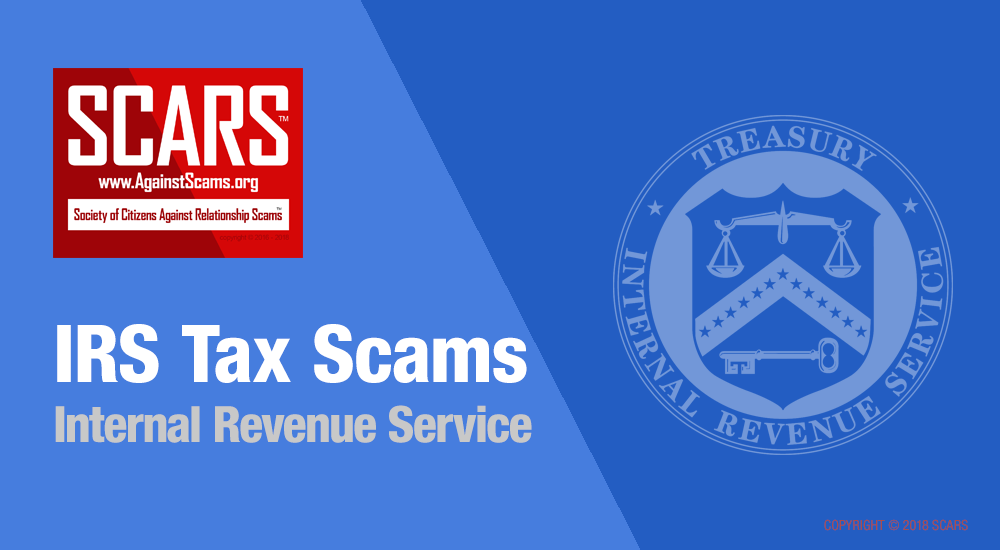
SCARS Institute’s Encyclopedia of Scams™ Published Continuously for 25 Years

SCARS™ Scam Alert: Tax Identity Thieves And IRS Imposters Are Ready For Tax Season
Tax identity thieves and IRS imposters are ready for tax season, whether you are or not. Join the FTC and its partners for Tax Identity Theft Awareness Week to find out how to protect yourself, and what to do if you or someone you know runs into problems.
What is tax identity theft? It happens when someone uses your Social Security number (SSN) to file a phony tax return and collect your refund. You may not find out it has happened until you try to file your real tax return and the IRS rejects it as a duplicate filing.
IRS imposters are scammers who pretend they’re calling from the IRS. They claim you owe taxes and demand that you pay right now, usually with a gift card or prepaid debit card. They threaten you’ll be arrested or face other bad consequences if you don’t pay. But it’s all a lie. If you send the money, it’s gone.
Join the FTC and its partners for free webinars and other events during Tax Identity Theft Awareness Week. Learn how to reduce your chance of tax identity theft, the red flag warning signs of IRS imposters, and what to do if fraud happens to you. All of the events will have information for everyone. Some also will highlight special resources for active duty service members, veterans, older adults and small businesses. Ask questions too. Check out the Calendar below to find the event that’s best for you.
To start fighting tax identity theft right away, remember:
- Protect your SSN throughout the year. Don’t give it out unless there’s a good reason and you’re sure who you’re giving it to.
- File your tax return as early in the tax season as you can.
- Use a secure internet connection if you file electronically, or mail your tax return directly from the post office.
- Research a tax preparer thoroughly before you hand over personal information.
- Check your credit report at least once a year for free at annualcreditreport.com. Make sure no one has opened a new account in your name.
Tax-Related Identity Theft
An identity thief may use your Social Security number (SSN) to get a tax refund or a job. This is tax-related identity theft. You may not know it has happened until:
- the IRS sends you a letter by mail saying they have gotten a suspicious tax return that uses your SSN, or
- you try to efile your return but it’s rejected as a duplicate because a return already has been filed using your SSN
If the IRS sends you a letter, follow the instructions in the letter. Then visit IdentityTheft.gov to report the identity theft to both the IRS and the FTC and get a recovery plan.
- Uncovering Tax-Related Identity Theft
- Dealing With Tax-Related Identity Theft
- Other Steps to Repair Identity Theft
Uncovering Tax-Related Identity Theft
If someone uses your SSN to file for a tax refund before you do, here’s what happens: When you file your return, IRS records will show that someone else has already filed and gotten a refund. If you file by mail, the IRS will send you a notice or letter in the mail saying that more than one return was filed for you. If you try to efile, the IRS will reject your tax return as a duplicate filing.
If someone uses your SSN to get a job, the employer may report that person’s income to the IRS using your SSN. When you file your tax return, you wouldn’t have included those earnings. IRS records will show you failed to report all your income. The agency will send you a notice saying you had wages that you didn’t report. But the IRS doesn’t know those wages were reported by an employer you don’t know, for work performed by someone else.
IRS notices about tax-related identity theft are sent by mail. The IRS doesn’t initiate contact with a taxpayer by sending an email, text, or social media message that asks for personal or financial information. The IRS also does not call taxpayers with threats of lawsuits or arrests. And, the IRS will never ask you to wire money, pay with a gift card or prepaid debit card, or share your credit card information over the phone.
If you get an email, text, or other electronic message that claims to be from the IRS, do not reply or click on any links. Instead, forward it to phishing@irs.gov. And report IRS imposters to the US Treasury Inspector General for Tax Administration at tigta.gov.
Dealing With Tax-Related Identity Theft
If the IRS sends you a notice or letter saying that someone used your SSN to get a tax refund, or saying there’s another problem, respond quickly and follow the instructions in the letter.
- Call the IRS using the telephone number given in the letter. You’ll need the letter and a copy of your prior year’s tax return when you call to help verify your identity. Visit the IRS’s guide, IRS Identity Theft Victim Assistance: How It Works, for more information.
If you think someone used your SSN to file for a tax refund, but you haven’t gotten a letter from the IRS, use IdentityTheft.gov to report it to the IRS and FTC and get a recovery plan.
- Visit IdentityTheft.gov to complete an IRS Identity Theft Affidavit (IRS Form 14039) and submit it to the IRS online so that the IRS can begin resolving your case. You’ll also be reporting the identity theft to the FTC.
- File your tax return, and pay any taxes you owe. If you can’t efile your tax return, you may need to mail a paper return.
Other Steps to Repair Identity Theft
Next, it’s important to limit the potential damage from identity theft.
- Put a fraud alert on your credit reports.
- Order your free credit reports and close any new accounts opened in your name.
- Consider placing a credit freeze on your credit reports.
Visit IdentityTheft.gov for help with these important steps.
Calendar of Anti-Scam Events
Each event is scheduled for an hour unless otherwise stated. Click the links to learn how to participate.
Wednesday, January 29, 1 p.m. ET
The FTC, Veterans Administration (VA), and U.S. Postal Inspection Service host a webinar on identity theft, tax identity theft, and more. Find out about special services available to veterans and active duty service members while getting a few days’ start on Tax Identity Theft Awareness Week.
Monday, February 3, 2 p.m. ET
The first of two 30-minute webinars hosted by the FTC and the Identity Theft Resource Center. The February 3 webinar focuses on identity theft, its impact on victims, tax identity theft, and recovering from identity theft. The second webinar, on February 6, focuses on IRS imposters and other government imposter scams.
Tuesday, February 4, 2 p.m. ET
Protecting Sensitive Business and Customer Information: Practical Data Security Practices for Your Business. Experts from the FTC and IRS discuss:
- Protecting your business, customers, and employees against tax identity theft
- Imposter scams that target small businesses
- Practical cybersecurity practices, and
- Responding to a data breach
Wednesday, February 5, 10 a.m. ET and 1 p.m. ET
AARP, the FTC, and the U.S. Treasury Department will hold two telephone Town Hall meetings, at 10 a.m. ET and 1 p.m. ET. Learn about tax identity theft, government impostor scams, recovering from fraud, and where to get help. Please join us at the meeting time that’s convenient for you.
Thursday, February 6, 2 p.m. ET
The FTC and the Identity Theft Resource Center co-host a 30-minute webinar on government imposter scams. We’ll talk about IRS, Social Security Administration, and U.S. Census Bureau imposters, red flag warnings, protecting yourself, and how to recover if fraud happens to you.
Thursday, February 6, 3 p.m. ET
Join experts from the FTC, the Identity Theft Resource Center, and others for an #IDTheftChat on Twitter. We’ll offer tips on protecting yourself from tax identity theft and government imposters. Join the conversation at #IDTheftChat.
TAGS: SCARS, Important Article, Information About Scams, Anti-Scam, Scam Alert, Tax Identity Theft, Tax Identity Thieves, IRS Imposters, Ready For Tax Season, FTC, Federal Trade Commission, Internal Revenue Service, Anti-Scam Events, Fraud Alert
PLEASE SHARE OUR ARTICLES WITH YOUR CONTACTS
HELP OTHERS STAY SAFE ONLINE
SCARS™ Team
Society of Citizens Against Relationship Scams Inc.
A U.S. Based Crime Victims Assistance Nonprofit Organization
The Latest SCARS Posts:
FIND MORE SCAM NEWS
«SCAMCRIME.COM»
JOIN US ON FACEBOOK
«CLICK HERE»
END
MORE INFORMATION
– – –
Tell us about your experiences with Romance Scammers in our
« Scams Discussion Forum on Facebook »
– – –
FAQ: How Do You Properly Report Scammers?
It is essential that law enforcement knows about scams & scammers, even though there is nothing (in most cases) that they can do.
Always report scams involving money lost or where you received money to:
- Local Police – ask them to take an “informational” police report – say you need it for your insurance
- U.S. State Police (if you live in the U.S.) – they will take the matter more seriously and provide you with more help than local police
- Your National Police or FBI « www.IC3.gov »
- The SCARS|CDN™ Cybercriminal Data Network – Worldwide Reporting Network on « www.Anyscam.com »
This helps your government understand the problem, and allows law enforcement to add scammers on watch lists worldwide.
– – –
To learn more about SCARS visit « www.AgainstScams.org »
Please be sure to report all scammers
on « www.Anyscam.com »
Disclaimer:
SCARS IS A DIGITAL PUBLISHER AND DOES NOT OFFER HEALTH OR MEDICAL ADVICE, LEGAL ADVICE, FINANCIAL ADVICE, OR SERVICES THAT SCARS IS NOT LICENSED OR REGISTERED TO PERFORM.
IF YOU’RE FACING A MEDICAL EMERGENCY, CALL YOUR LOCAL EMERGENCY SERVICES IMMEDIATELY, OR VISIT THE NEAREST EMERGENCY ROOM OR URGENT CARE CENTER. YOU SHOULD CONSULT YOUR HEALTHCARE PROVIDER BEFORE FOLLOWING ANY MEDICALLY RELATED INFORMATION PRESENTED ON OUR PAGES.
ALWAYS CONSULT A LICENSED ATTORNEY FOR ANY ADVICE REGARDING LEGAL MATTERS.
A LICENSED FINANCIAL OR TAX PROFESSIONAL SHOULD BE CONSULTED BEFORE ACTING ON ANY INFORMATION RELATING TO YOUR PERSONAL FINANCES OR TAX RELATED ISSUES AND INFORMATION.
This content and other material contained on the website, apps, newsletter, and products (“Content”), is general in nature and for informational purposes only and does not constitute medical, legal, or financial advice; the Content is not intended to be a substitute for licensed or regulated professional advice. Always consult your doctor or other qualified healthcare provider, lawyer, financial or tax professional with any questions you may have regarding the educational information contained herein. SCARS makes no guarantees about the efficacy of information described on or in SCARS’s Content. The information contained are subject to change and are not intended to cover all possible situations or effects. SCARS does not recommend or endorse any specific professional or care provider, product, service, or other information that may be mentioned in SCARS’s websites, apps, and Content unless explicitly identified as such.
The disclaimers herein are provided on this page for ease of reference. These disclaimers supplement and are a part of SCARS’s websites Terms of Use.
Legal Notices:
All original content is Copyright © 1991 – 2020 Society of Citizens Against Relationship Scams Inc. (D.B.A SCARS) All Rights Reserved Worldwide & Webwide. Third-party copyrights acknowledge.
SCARS, SCARS|INTERNATIONAL, SCARS, SCARS|SUPPORT, SCARS, RSN, Romance Scams Now, SCARS|WORLDWIDE, SCARS|GLOBAL, SCARS, Society of Citizens Against Relationship Scams, Society of Citizens Against Romance Scams, SCARS|ANYSCAM, Project Anyscam, Anyscam, SCARS|GOFCH, GOFCH, SCARS|CHINA, SCARS|CDN, SCARS|UK, SCARS|LATINOAMERICA, SCARS|MEMBER, SCARS|VOLUNTEER, SCARS Cybercriminal Data Network, Cobalt Alert, Scam Victims Support Group, are all trademarks of Society of Citizens Against Relationship Scams Inc.
Contact the law firm for the Society of Citizens Against Relationship Scams Incorporated by email at legal@AgainstScams.org
-/ 30 /-
What do you think about this?
Please share your thoughts in a comment below!
Table of Contents
- Tax-Related Identity Theft
- Calendar of Anti-Scam Events
- U.S. Veterans Benefits Scams – 2026
- New AI Voice Cloning Phone Scams – 2026
- An Essay on Justice and Money Recovery – 2026
- Virtual Kidnapping & Extortion – Proof of Life Images or Videos – 2026
- Fake Money Recovery Law Firms – 2026
- Money Laundering Drop Accounts – 2026
LEAVE A COMMENT?
Recent Comments
On Other Articles
- Arwyn Lautenschlager on Love Bombing And How Romance Scam Victims Are Forced To Feel: “I was love bombed to the point that I would do just about anything for the scammer(s). I was told…” Feb 11, 14:24
- on Dani Daniels (Kira Lee Orsag): Another Scammer’s Favorite: “You provide a valuable service! I wish more people knew about it!” Feb 10, 15:05
- on Danielle Delaunay/Danielle Genevieve – Stolen Identity/Stolen Photos – Impersonation Victim UPDATED 2024: “We highly recommend that you simply turn away form the scam and scammers, and focus on the development of a…” Feb 4, 19:47
- on The Art Of Deception: The Fundamental Principals Of Successful Deceptions – 2024: “I experienced many of the deceptive tactics that romance scammers use. I was told various stories of hardship and why…” Feb 4, 15:27
- on Danielle Delaunay/Danielle Genevieve – Stolen Identity/Stolen Photos – Impersonation Victim UPDATED 2024: “Yes, I’m in that exact situation also. “Danielle” has seriously scammed me for 3 years now. “She” (he) doesn’t know…” Feb 4, 14:58
- on An Essay on Justice and Money Recovery – 2026: “you are so right I accidentally clicked on online justice I signed an agreement for 12k upfront but cd only…” Feb 3, 08:16
- on The SCARS Institute Top 50 Celebrity Impersonation Scams – 2025: “Quora has had visits from scammers pretending to be Keanu Reeves and Paul McCartney in 2025 and 2026.” Jan 27, 17:45
- on Scam Victims Should Limit Their Exposure To Scam News & Scammer Photos: “I used to look at scammers photos all the time; however, I don’t feel the need to do it anymore.…” Jan 26, 23:19
- on After A Scam, No One Can Tell You How You Will React: “This article was very informative, my scams happened 5 years ago; however, l do remember several of those emotions and/or…” Jan 23, 17:17
- on Situational Awareness and How Trauma Makes Scam Victims Less Safe – 2024: “I need to be more observant and I am practicing situational awareness. I’m saving this article to remind me of…” Jan 21, 22:55
ARTICLE META
Important Information for New Scam Victims
- Please visit www.ScamVictimsSupport.org – a SCARS Website for New Scam Victims & Sextortion Victims
- Enroll in FREE SCARS Scam Survivor’s School now at www.SCARSeducation.org
- Please visit www.ScamPsychology.org – to more fully understand the psychological concepts involved in scams and scam victim recovery
If you are looking for local trauma counselors please visit counseling.AgainstScams.org or join SCARS for our counseling/therapy benefit: membership.AgainstScams.org
If you need to speak with someone now, you can dial 988 or find phone numbers for crisis hotlines all around the world here: www.opencounseling.com/suicide-hotlines
A Note About Labeling!
We often use the term ‘scam victim’ in our articles, but this is a convenience to help those searching for information in search engines like Google. It is just a convenience and has no deeper meaning. If you have come through such an experience, YOU are a Survivor! It was not your fault. You are not alone! Axios!
A Question of Trust
At the SCARS Institute, we invite you to do your own research on the topics we speak about and publish, Our team investigates the subject being discussed, especially when it comes to understanding the scam victims-survivors experience. You can do Google searches but in many cases, you will have to wade through scientific papers and studies. However, remember that biases and perspectives matter and influence the outcome. Regardless, we encourage you to explore these topics as thoroughly as you can for your own awareness.
Statement About Victim Blaming
SCARS Institute articles examine different aspects of the scam victim experience, as well as those who may have been secondary victims. This work focuses on understanding victimization through the science of victimology, including common psychological and behavioral responses. The purpose is to help victims and survivors understand why these crimes occurred, reduce shame and self-blame, strengthen recovery programs and victim opportunities, and lower the risk of future victimization.
At times, these discussions may sound uncomfortable, overwhelming, or may be mistaken for blame. They are not. Scam victims are never blamed. Our goal is to explain the mechanisms of deception and the human responses that scammers exploit, and the processes that occur after the scam ends, so victims can better understand what happened to them and why it felt convincing at the time, and what the path looks like going forward.
Articles that address the psychology, neurology, physiology, and other characteristics of scams and the victim experience recognize that all people share cognitive and emotional traits that can be manipulated under the right conditions. These characteristics are not flaws. They are normal human functions that criminals deliberately exploit. Victims typically have little awareness of these mechanisms while a scam is unfolding and a very limited ability to control them. Awareness often comes only after the harm has occurred.
By explaining these processes, these articles help victims make sense of their experiences, understand common post-scam reactions, and identify ways to protect themselves moving forward. This knowledge supports recovery by replacing confusion and self-blame with clarity, context, and self-compassion.
Additional educational material on these topics is available at ScamPsychology.org – ScamsNOW.com and other SCARS Institute websites.
Psychology Disclaimer:
All articles about psychology and the human brain on this website are for information & education only
The information provided in this article is intended for educational and self-help purposes only and should not be construed as a substitute for professional therapy or counseling.
While any self-help techniques outlined herein may be beneficial for scam victims seeking to recover from their experience and move towards recovery, it is important to consult with a qualified mental health professional before initiating any course of action. Each individual’s experience and needs are unique, and what works for one person may not be suitable for another.
Additionally, any approach may not be appropriate for individuals with certain pre-existing mental health conditions or trauma histories. It is advisable to seek guidance from a licensed therapist or counselor who can provide personalized support, guidance, and treatment tailored to your specific needs.
If you are experiencing significant distress or emotional difficulties related to a scam or other traumatic event, please consult your doctor or mental health provider for appropriate care and support.
Also read our SCARS Institute Statement about Professional Care for Scam Victims – click here to go to our ScamsNOW.com website.
















![To Be A Scammer? An Overview Of Scammers Fraudsters & Online Con Artists - 2024 [UPDATED] what is a scammer what-is-a-scammer](https://romancescamsnow.com/wp-content/uploads/2021/10/what-is-a-scammer.png)
![New Research Study on Stolen Valor - Military Scams - STUDY NOW COMPLETED [UPDATED] Military Impersonation Research Study New Research Study on Stolen Valor - Military Scams](https://romancescamsnow.com/wp-content/uploads/2022/03/Military-Impersonation-Research-Study.png)







Thank you for your comment. You may receive an email to follow up. We never share your data with marketers.